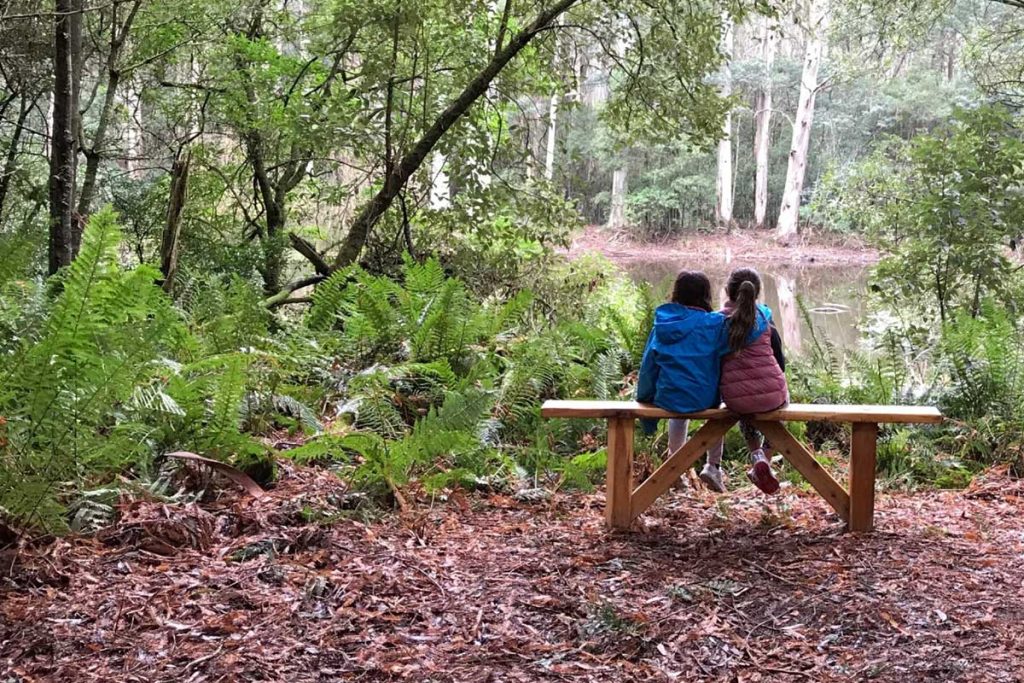Shinrin-yoku – or forest bathing – has interesting origins. To get there, take a leap back in time and consider the period when humans were living mostly outdoors and hunting for food, with only basic forms of shelter providing minimal comfort. Was life easier back then or harder?
You would presume having to hunt and gather food and build your own shelter was infinitely harder. Today we have wireless technology on tap, Uber Eats, supermarkets and fast-food outlets nearby, a myriad of home appliances, and heating and cooling at the press of a button. So why are we so tired, anxious and stressed in comparison to ancient dynasties?
Perhaps because we have overloaded, fast-paced, technology-saturated lives and we spend substantially more time indoors than our ancestors who communed daily with nature.
But with research into natural therapies such as the Japanese concept of “forest bathing” indicating significant psychological and physiological benefits, we are now seeing a return to these ‘grass roots’ therapies as we attempt to detox from technology, de-stress from too-busy lives, and detach from the hectic demands of modern-day living.
Forest bathing explained
Forest bathing does not require water or a bath tub, nor is it solely the domain of wilderness lovers. It is the term for a mindful practice which originated in Japan in the 1980’s where it was known as “shinrin-yoku” which translates to “forest bathing.”
Shinrin-yoku describes a form of ecotherapy, the practice of grounding ourselves in nature in a mindful or meditative manner to improve our mental, emotional and physical wellbeing. While there is a direct translation from the Japanese practice, many cultures have long benefitted from experiences that connect the natural world with good health.
For those of us that enjoy a hike in the bush for example, forest bathing is essentially making a conscious decision to put our hike on pause and be still for a while, so we can connect with nature via sensory engagement. And if you’re not into hiking, a regular stroll to a nature reserve where you can spend a few quiet moments immersing yourself in your surrounds is all that is needed.
Forest bathing invites stillness in a natural environment. It involves the mindful or meditative process of sitting or standing and breathing in the smells of the bush, listening to the silence, the birds, the wind in the trees or the chirping crickets, seeing the textures and colours of the trees and the sunlight dappling through the leaves, and feeling the cool earth, smooth stones or soft grass beneath our bare feet.
The benefits associated with forest bathing
Many studies have shown that spending time outside is good for brain development and mental or emotional wellbeing. This was particularly obvious during covid lockdowns, when the number of people experiencing depression and high levels of anxiety escalated. When people were able to go back to spending time outdoors exercising, walking or simply being in nature, moods and stress levels improved.
Research into ‘eco-therapies’ such as forest bathing also show that the benefits are both physiological and psychological. Studies indicate that forest bathing has the ability to:
- Reduce blood pressure
- Decrease cortisol levels
- Lower heart rates
- Alleviate stress
- Improve mood disorders such as depression and anxiety
- Improve the ability to focus
Growing research into attention deficit disorders has shown that spending time in nature can help people’s ability to focus, highlighting the importance of outdoor play for children and the need for increased green urban spaces in high density housing areas.
Research into mood disorders such as depression has also shown that there is a difference in the moods of patients taking a one hour daily walk outdoors (in conjunction with regular treatments) compared to those who don’t.
For families who have someone experiencing a mental health disorder such as depression or anxiety, forest bathing is a great way to enjoy a shared experience that is highly beneficial for all family members.
You can find out more about forest bathing by talking with the professional team delivering a wide range of mental health services at Relational Minds. If you or a family member is struggling with a mental health disorder, please get in touch with our Sunbury or Mildura clinics.




